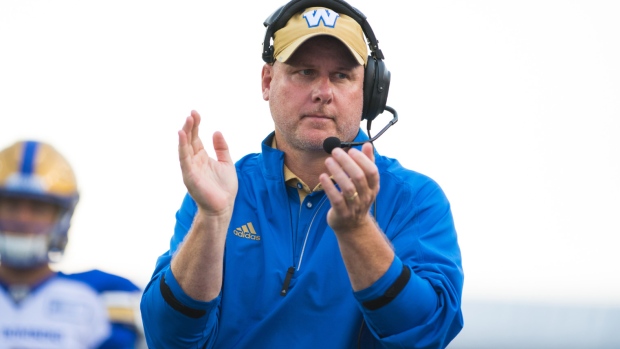Jan 24, 2019
CFL’s policy on coaching hires needs a tweak
The league has gone from a very loose policy on recruiting coaches from other teams to one that goes too far, giving teams complete veto power over their coaching employees’ ability to move for promotion, Dave Naylor writes.
By Dave Naylor

Three years ago the Canadian Football League supposedly cleaned up the chaos and confusion around the hiring of coaches from other teams, ending the practice of coaches bolting from one city to another at the drop of the hat.
In some circumstances, the team losing the coach to another club was among the last to know.
It all hit a breaking point in the fall of 2015 when Chris Jones and his staff moved from Edmonton to Saskatchewan, a process that appeared to begin before the Eskimos won the Grey Cup that season.
That was followed by Ottawa fighting (unsuccessfully) to keep its then-offensive co-ordinator Jason Maas from taking the job to replace Jones in Edmonton. The league subsequently blocked then-Montreal defensive co-ordinator Noel Thorpe from stepping away from his Alouettes contract for a job in Edmonton.
There was too much backdoor maneuvering, too many secrets and too much complaining from teams about coaching employees being able to leave at will, contracts be damned.
The result was a new policy on hiring under then-commissioner Jeffrey Orridge. Under the new rules, teams seeking to interview a coach under contract are required to request permission from that coach’s current team president. The commissioner is required to sign-off on these arrangements and a compensation formula is in place for when a hiring takes place.
In other words, no more Wild West hiring scenes, no more teams feeling burned and betrayed, and no more coaches packing up their offices in the middle of the night.
Problem solved, right?
Well, yes. But that policy has created a new problem and the league’s coaches are furious.
The problem was highlighted this month with the Saskatchewan Roughriders head coaching search, which was precipitated by the departure of Jones to the NFL’s Cleveland Browns on Jan. 14.
Within a few days, the Roughriders reached out for permission to interview two obvious candidates who had already interviewed for other CFL head coaching jobs in December: Ottawa offensive co-ordinator Jaime Elizondo and Winnipeg offensive co-ordinator Paul LaPolice.
Both the Redblacks and Blue Bombers said no. Both candidates were disappointed and apparently surprised.
Meanwhile, the coaching fraternity was incredulous behind the scenes, suggesting that any league where coaches have no retirement pension and where salaries are under a cap shouldn’t be allowing teams to get in the way of promotions.
And they are right – to a point.
The problem is the CFL has gone from a very loose policy on recruiting coaches from other teams to one that goes too far, giving teams complete veto power over their coaching employees’ ability to move for promotion.
So if Saskatchewan had requested permission to interview LaPolice or Elizondo the first week of December, their respective teams would still have had the right to say no. That makes absolutely no sense.
Is it really too late in the off-season to be able to replace an offensive co-ordinator? There are those who believe the recent refusals have more to do with Winnipeg simply not wanting LaPolice going to their rival and Ottawa being nervous about Elizondo’s ties to pending free-agent quarterback Trevor Harris.
Did the Redblacks and Blue Bombers do anything wrong? No. They acted in the best interests of their teams, which is what the CFL’s policy empowers them to do. But putting a coach’s ability to advance completely at the discretion of his employer is wrong.
Here is how to fix that.
CFL coaches should be able to interview for any job promotion up until a certain date – unless otherwise specified in their contracts. (For example, a team gives a coach a two-year extension with the provision that he not be able to leave after one year for another job, promotion or not.).
That date could be Jan. 20, Feb. 1, the Super Bowl or whenever.
The point is there should be a period where coaches are able to interview for other jobs without needing permission to do so. Up until the agreed upon date, teams doing the hiring should be required only to give notice to the team that employs the candidate.
Then, only once the agreed upon date has passed, would a club have the ability to deny permission.
This would bring both clarity and fairness, which is important. With lower salaries than NFL or most NCAA jobs, a football operations salary cap and no pension, it’s already a very challenging environment for CFL coaches.
Granting teams the ability to restrict their movement at any point in the off-season makes it unnecessarily worse.


